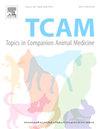Haematogenous polyostotic osteomyelitis caused by Serratia marcescens in a cat
IF 1.3
3区 农林科学
Q2 VETERINARY SCIENCES
引用次数: 0
Abstract
A 2-year-old female Bengal cat was referred for acute right forelimb lameness one month after ovariectomy. Physical examination revealed multifocal pain on bone palpation and fever. Radiographs showed mixed lytic-proliferative polyostotic diaphyseal osteopathy of multiple bone segments. Histopathologic evaluation of bone biopsies showed severe chronic pyogranulomatous osteomyelitis and multidrug-resistant Serratia marcescens was cultured. Antibiotic therapy with piperacillin-tazobactam was administered for 60 days, based on susceptibility testing. Lameness and bone pain resolved within 15 days, and radiographs after 30 days showed decreased bone lysis. At a 6-month recheck, the cat recovered completely, and only bone remodelling was evident on radiographs.
Multifocal bacterial haematogenous osteomyelitis (HO) caused by Serratia marcescens was diagnosed in an adult immunocompetent cat. HO is infrequently reported in dogs and cats with young and immunocompromised patients being most at risk. Prior ovariectomy and anaesthesia may have predisposed the cat to the development of a hospital-associated infection (HAI), as other aetiologies or predisposing causes for osteomyelitis were reasonably excluded. Serratia marcescens is a gram-negative bacterium recently reported as responsible for human and veterinary HAIs, although it has never been stated for HO in small animals. Early recognition and antibiotic therapy led to good outcome in this case.
一只猫由大肠沙雷氏菌引起的血源性多发性骨髓炎。
一只两岁大的雌性孟加拉猫在卵巢切除术后一个月因急性右前肢跛行而转诊。体格检查显示,触骨时有多处疼痛,并伴有发烧。X光片显示,多个骨节出现混合性溶解-增生性多骨质软骨病。骨活检组织病理学评估显示,患者患有严重的慢性化脓性骨髓炎,并培养出了耐多药的大肠沙雷氏菌。根据药敏试验结果,使用哌拉西林-他唑巴坦进行了为期 60 天的抗生素治疗。跛行和骨痛在 15 天内缓解,30 天后的 X 光片显示骨溶解减少。在 6 个月的复查中,猫咪完全康复,X 光片上只显示出骨骼重塑。在一只免疫功能正常的成年猫身上诊断出了由马氏沙雷氏菌引起的多灶性细菌性血源性骨髓炎(HO)。多灶性细菌性血源性骨髓炎(HO)在猫狗中并不多见,年轻和免疫力低下的患者最易感染。由于合理排除了骨髓炎的其他病因或诱因,该猫之前的卵巢切除术和麻醉可能使其容易发生医院相关感染(HAI)。马氏沙雷氏菌(Serratia marcescens)是一种革兰氏阴性菌,最近有报道称它可导致人类和兽医的 HAIs,但从未听说过它可导致小动物的 HO。早期识别和抗生素治疗为该病例带来了良好的疗效。
本文章由计算机程序翻译,如有差异,请以英文原文为准。
求助全文
约1分钟内获得全文
求助全文
来源期刊

Topics in companion animal medicine
农林科学-兽医学
CiteScore
2.30
自引率
0.00%
发文量
60
审稿时长
88 days
期刊介绍:
Published quarterly, Topics in Companion Animal Medicine is a peer-reviewed veterinary scientific journal dedicated to providing practitioners with the most recent advances in companion animal medicine. The journal publishes high quality original clinical research focusing on important topics in companion animal medicine.
 求助内容:
求助内容: 应助结果提醒方式:
应助结果提醒方式:


